

Project «Voices of Jewish settlements. Vitebsk region.»פיתוח קשרי התרבות בין העמים של ישראל ובלרוס
|
|---|
Website search |
|
MainNew publicationsContactsSite mapVitebsk regionMogilev regionMinsk regionArkady Shulman
|
HE WAS THE ONLY TO SURVIVE…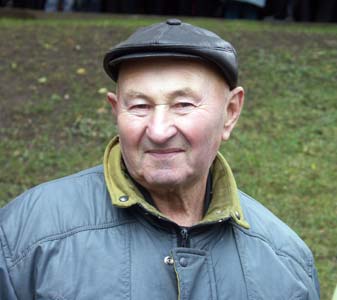 Semen Feigelman. Photo taken in 2008.
Semen Feigelman. Photo taken in 2008.
Semen Klimentievich is an active and cheerful person. Such people do not need to be asked what their age is. He has long been retired but he is not getting bored with life. He is the head of the War Veterans’ society at Polotsk Jewish center. They have weekly meetings to discuss everyday issues. Currently, the issue of discussions is setting up monuments in the places, where Polotsk Jews were executed in the Great Patriotic War. Semen Klimentievich is a frequent guest at a high school in Borovukha, where he used to work after moving to Polotsk. Now he comes to visit and narrate the students about the war and his military service. Semen Feigelman experienced all the horrors of life in a ghetto when living in a small town of Lepel. He was lucky to survive, helped partisans and did military service. After going through hell he is still a friendly and kind person. We agreed to meet. I came to Polotsk to walk to Semen Klimentievich. - Have you seen the mass grave in Chernoruchie? – he inquired at the beginning of our conversation. This is the place were hundreds of Lepel Jews took their last refuge after being shot by fascists and their assistants. 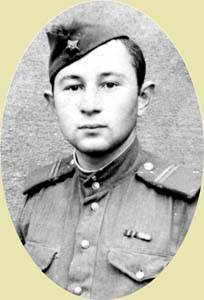 Semen Feigelman. Photo taken in 1948.
Semen Feigelman. Photo taken in 1948.
- A few times, - I replied. - I could be there, too, - said Semen Klimentievich. – My parents, brothers, relatives and friends are in that grave. - Tell me about them, - I asked. - Grandfather’s name was Afroim Feigelman, born in about 1870. He took part in the Japan war. He earned a living as a joiner and a carpenter. Grandfather had three sons: my father Kalman, Faivel and the youngest one Zaivel. I don’t remember grandmother’s name – she died before the war and then there was no one I could even ask about it. My father also worked as a joiner and a carpenter for the railway. He turned 45 just before the war. Mom was a housewife. Her name was Hana, maiden name – Gurevich. There were three children in our family: I was the elder brother, then my sister Sonia and brother Joseph. They are all long gone but in my mind I can remember everything to the slightest detail. Joseph had a cut on his lip and right before the war my parents were planning to take him to Leningrad for an operation. We used to live in Lepel at Volodarskaya Street, 46, which was close to the market. I was born on November 29th, 1926 and in 1941 I was already 14, so I can remember everything so vividly that I sometimes think it would be better if I forgot certain details. I attended a Belarusian school. My parents did not make me do homework because I was very diligent by nature. After school I dreamt of joining the Army – many boys had such dreams at that time. On June 22nd, 1941 I went fishing with my friends. There was a lake and a river nearby and we frequently went either fishing or swimming. That day we caught a lot of fish and were heading home, laughing. As soon as we reached the town we saw people crying and then noticed a crowd of people next to the loudspeaker. It was around noon. Then we heard people mentioning the word “war”. I came home and also heard crying. Mother was asking: “What will happen?” But grandfather tried to calm her down saying that the previous time (the First World War) Germans also had been in Lepel and they had not done anyone any harm. Grandfather was a truly religious man and he said that we were under God’s protection. We were contemplating whether we should move eastward or not. Many of my father’s colleagues were leaving but he decided to stay under grandfather’s influence. I insisted on leaving but no one listened. About a third of Jews decided it was better to leave… Did we really know how fascists treated Jews? There was some information that came from Polish refugees, who settled in Lepel after 1939. They claimed that fascists were extremely cruel to Jews, but in our family this information was not taken seriously and grandfather assured us it was “propaganda”. Then in only a few days we experienced the first bombings. Everyone realized now that it was better to leave. We reached a village called Kazinisha, where grandfather and father had a lot of acquaintances. However on June 28th Germans were ahead of us and we came back to Lepel. We returned to our house – it had not been broken into or robbed. Germans came into Lepel practically without fighting and immediately they walked around the houses demanding eggs and butter. They wanted to kill my mother when she tried to explain to them that we did not have enough food. So, we had to give them two hens and eggs. At the beginning of July Germans gathered all the Jews in the town center and announced that they should all attach yellow stars to their houses, attach strips of yellow fabric to their clothes at the front and the back and wear bands with inscription “Jude” on their arms. They were allowed to walk only in the middle of the streets, not on the pavements. If the rule was violated the “criminals” were executed. Jews were forced to do hard physical work. Later, in the middle of July, all the Jews were gathered one more time and ordered to move to the ghetto. They were allowed to take only the most necessary things. The ghetto was between Vokzalnaya and Kanalnaya streets. They were given two or three hours to move to the ghetto. Each house was occupied by four or five families. The house we moved into had 12 or 13 people, all relatives. I have no idea who settled in our house, since we were prohibited to exit the ghetto. The place was guarded partially by Germans but mainly by Nazi policemen, people from Lepel, many of whom I had known before the war. For instance, Sublinsky. He was in prison after the war for 10 years and then died. My father’s brother also turned out in the ghetto, with his wife and two daughters; also there was his younger brother’s wife and their 1.5-year-old daughter. We do not know what happened to the youngest brother. Germans knew my father was a skilled joiner and from time to time they charged him to make suitcases of plywood. But as a rule he had to do the same hard physical work as the rest of the ghetto dwellers. 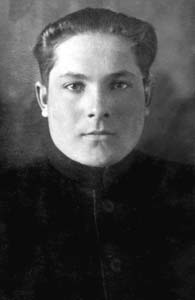
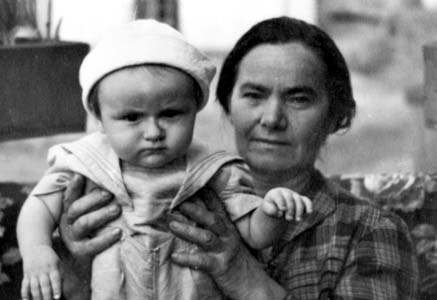 Vadim Gritz. Photo taken in 1952. Yevgenia Andreyevna Gritz with grandchild. Photo taken in 1965.
Vadim Gritz. Photo taken in 1952. Yevgenia Andreyevna Gritz with grandchild. Photo taken in 1965.
I sometimes left the ghetto secretly and asked some acquaintances for food, but usually got just potato peels and returned. The potato peels were carefully washed, grated and then were used to make pancakes. Since there was no oil, we just put salt into the frying pan. That was considered to be good food at the time. Many people died of starvation, many got sick. There was no medicine. The ghetto had a doctor – Gelfand. Even Germans took him to their hospital to advise their doctors. Then Gelfand was run over by a car. They say it was intentional. There were other doctors, too, but medicine was scarce… The Nazis checked the ghetto every day to make sure nobody had escaped. This was usually done in the morning. Once a Nazi came in and started counting. Everyone had to bend down in front of him and take off a hat, which I did not. He began shouting and hitting me with a rubber lash. I have no memories of what happened after that because I fainted. When I was brought round, he had gone. After that incident I made a decision to flee. But my parents said that if the Nazis noticed someone was missing they would shoot the whole family. So they said: “We will all die because of you.” Both Germans and their assistant policemen taunted Jews just for fun. That lasted till February 28th, 1942. It was before 6 a.m. and we heard noise and shouting outside. We realized that we would be taken to be executed. There had been talks about executions in Kamen, Begoml, Polotsk. We were aware of what was going to happen. I ran out of the house and headed towards the river. It happened at dawn on a very cold day. I did not feel how cold it was. There were about 5 people who tried to escape. The Germans noticed us and started shooting. Three people were shot to death, one was wounded and I was so scared that I fell into the snow and lay there motionless. It was about 400 meters from my house. The Germans assumed I was dead and as soon as they left I began crawling towards the river. On the bank of the Essa I rose and started running again. Then I heard some noise behind and I decided to try and swim across. I ran to Matushino, a village where my father had an acquaintance, Alexander. On the way I saw a group of Germans, so I fell into the snow again and pretended to be dead. When I reached Alexaner’s house I was told that there were policemen in the village and it was not safe to stay there. My feet turned white because of the frost, so Alexander’s daughter rubbed them with fat and gave me socks and dry shoes. They also gave me a piece of bread but warned me against eating it all at once, since I had not eaten anything for days. Alexander told me to beware of Germans and policemen, who were searching for runaways. He advised me to walk towards Vitebsk and try to cross the frontal line. So I went. Nobody let me stay in their houses – people were too scared, so I stayed in barns, in hay stacks. I told people that I had come from an orphanage. My feet were killing me, all the clothes were rotten and I had lice. There was no food. Very seldom someone would give me a little food. 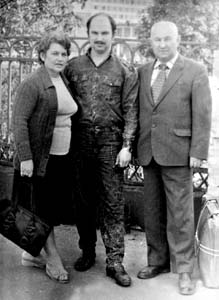 Semen Feigelman with wife and son.
Semen Feigelman with wife and son.Photo taken in 1989. Then I met an old woman, helped her carry her things. As we were going to cross a bridge, I asked her to tell Germans that I was her son. When we approached the bridge, one of the guards started poking his hand at me, and the woman told him I was her son. We reached Vetrino. I understood that the old woman was not ready to let me stay, so I thanked her and moved on. I reached a village called Antopolie and there met a man, who helped me. He said: “You need treatment, otherwise you will die.” First he took me to his house, but it was very dangerous because someone in the village could report me to the police. Therefore he sent me to his relative, Nikita Vasilievich Gritz, a forester. His family lived in the woods, far from the village. I said my name was Senia and they did not ask what my family name was. Nikita and his wife Yevgenia took my clothes and burnt them, since they were swarming with lice. They had a son, Vadim, who was strictly ordered not to utter a word about me to anyone. - Did they know who you were? Did they realize they were hiding a Jew? – I asked. - They never asked me about it and I, naturally, said nothing. There are moments when nothing needs to be said. We went to the bathhouse together… I turned away, pretending to be shy. I think the forester and his wife realized who they were hiding but they never discussed that in presence of Semen and their small son. - In the summer of 1942, - continues Semen Klimentievich, - two men came to stay at the forester’s house. They had escaped from a German prison camp. Later they joined the partisan movement but still continued to visit us from time to time. In 1944 we were liberated by the Soviet Army. I went to the military registration office and told them everything about me. I was soon recruited and sent to the North. Semen Klimentievich has two children: son Vladimir, who is a colonel in the Russian army and daughter Luda, who lives in Israel. His grandson Misha did military service in the Israeli Army and in 2007 took part in the war with Lebanon. Arkady Shulman |
|||
|
|
Jewish settlements in Vitebsk regionVitebsk • Albrehtovo • Babinovichi • Baran • Bayevo • Begoml • Beshenkovichi • Bocheikovo • Bogushevsk • Borkovichi • Braslav • Bychiha • Chashniki • Disna • Dobromysli • Dokshitsy • Druya • Dubrovno • Glubokoye • Gorodok • Kamen • Kohanovo • Kolyshki • Kopys • Krasnopolie • Kublichi • Lepel • Liady • Liozno • Lukoml • Luzhki • Lyntupy • Miory • Obol • Oboltsy • Orsha • Osintorf • Ostrovno • Parafianovo • Plissa • Polotsk • Prozorki • Senno • Sharkovshina • Shumilino • Sirotino • Slaveni• Smolyany • Surazh • Tolochin • Ulla • Verhnedvinsk • Vidzy • Volyntsy • Yanovichi • Yezerishe • Zhary • Ziabki • |
Main |
New publications |
Contacts |
Site map |
Vitebsk region |
Mogilev region |
Minsk region |